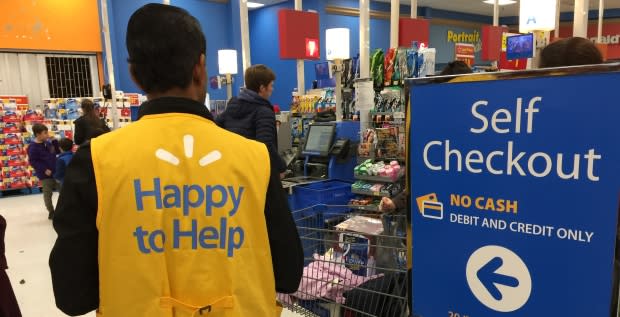Cape Breton Facebook group urges boycott of self-checkout machines
Self-checkouts are becoming an increasingly common part of the modern shopping experience, but some Cape Bretoners have mixed opinions on the technology.
Two Sydney businessmen, chiropractor David Dunn and Chuck Zwicker, the owner of a burger business, have teamed up to start a campaign against the machines. They launched a Facebook group called No Self-Checkouts, which has received more than 6,000 likes in a month.
Dunn said he started the campaign after a patient told him her hours were cut after her workplace installed self-checkouts. He believes people are losing jobs because of automation.
"Self-checkouts do not have a spouse or family to support, they do not volunteer in their communities and they do not pay taxes that go toward our health care or infrastructure," said Dunn.
Vanessa Childs Rolls, a historian and community activist in Sydney, said one reason she doesn't like them is because she thinks they are dirty.

"Lord knows what's on it and how often it has been cleaned," she told CBC's Cape Breton Information Morning. "I would much rather interact with a human being who has maybe washed their hands."
Childs Rolls also believes the technology takes away jobs from young people, recent immigrants and people looking for work.
Sydney lawyer Anna Manley told CBC's Cape Breton Information Morning that people shouldn't worry about eliminating jobs for cashiers. She said the public should be more concerned about a better future for the people who would likely fill those jobs.
'Jobs that people shouldn't be doing'
"People have a problem with job losses with them and I don't," said Manley. "These are the jobs that people shouldn't be doing. People should be moving on from that, I think it's a good thing."
There are about 30 self-checkout machines in the Sydney area alone, and likely more to come in the future.
Ramesh Venkat, a marketing professor at Saint Mary's University in Halifax, said there is an age divide for the willingness to use self-checkouts.
He said younger individuals tend to use them more, while older generations are more likely to go to a cashier.
"Their perceived ease of use seems to really dictate how satisfied they are with the self-checkout," said Venkat.
'Build relationships with customers'
Venkat said it makes sense from a business standpoint to install self-checkouts and have one or two employees try to attract customers to use them. He said the companies profit from allowing the customer to do the work of a cashier and they will have to pay fewer employees.
Venkat said people have become accustomed to self-checkouts in other places, such as self check-ins at airports or ABMs in banks, but he said companies should keep some cashiers.
"The retailer shouldn't really eliminate the human aspect because of the opportunity to build relationships with customers," said Venkat.
The hidden roles of a cashier
A union that represents retail and grocery workers said self-checkouts take away jobs and hours from employees, and cashiers also provide other important services that machines can't replace.
"Sometimes there's issues with the product the customer may not know, sometimes there's concern over what products to put with others when you're bagging them," said Craig Walsh, a national representative for the United Food and Commercial Workers Union.
"How to bag properly is something that cashiers are taught. Unless you had a history in retail, these are things you wouldn't even consider."
MORE TOP STORIES


